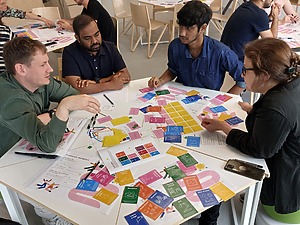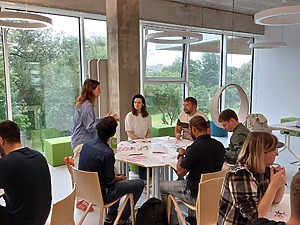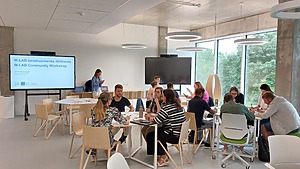On the 19th of June KTU Design Centre D-LAB team, while carrying out the project of the Center of Excellence in Technological and Physical Sciences (TiFEC), invited members of the M-LAB Laboratory Centre to a community workshop moderated by Melania Vicentini, a spatial designer and a PhD student in the field of design at Politecnico di Milano.
Participants from D-LAB, Physiological Monitoring, Neuro LAB, Young LAB, Infrastructure Development laboratories and guests from LSMU University got to know each other’s projects and daily needs, and started to plan how they could make the new science centre a more comfortable, inspiring place for all, fulfilling their work-related and social expectations.
During the participatory session, a toolkit developed by Melania was tested to help create a sense of community and solidarity through the adaptation of spaces and the creation of new services. The employees and contributing students discussed their daily impressions: the layout of the building, the spaces that are comfortable and uncomfortable for them, the services that are missing, the communication initiatives they would like to see from the personnel of the Centre, and the ways to improve safety, productivity and their overall emotional well-being.
Melania Vicentini, visiting lecturer at the Faculty of Mechanical Engineering and Design has organised workshops of this kind in Milan and Kaunas to test ideas born from her PhD research and look for ways to help communities enjoy their work and recreational spaces.
This format of creative design workshops is one of the services provided by the D-LAB Design Lab, curated by KTU Design centre, and is organised using creative and design thinking methods. The workshops are organised for the purpose of developing, defining, prototyping product/service ideas, for organisational transformation, for team building, public sector innovation, as well as for policy making.
“This gathering also contributed to the promotion of design as a facilitator of transformative processes. The participants of the workshop had a practical experience of how design tools function, which is very important in order to see the tangible impact of design research in a familiar environment,” says D.Gaižauskienė.
According to D-LAB researchers, changing the social climate of both small businesses and large organisations requires bottom-up initiatives, i.e. solutions that come from the needs identified by the community, rather than models imposed by the governing bodies. In the context of implementing the EU’s Green Deal, circular design addresses not only production resources or technologies, but also the re-engineering of the way systems work. Although the approach of such workshops is creative, it can result in tangible changes in workspaces, such as a different layout of existing premises, alternative opening hours for a particular building, or the replacement of existing services with alternative ones. All of these could influence both the allocation of the organisational budget and the efficiency of resource management. These are the tasks that the TiFEC project aims to address, since the changes created by design tools are not just cultural, says the Design Laboratory team.
The training event is organised within the framework of the project “Technological and Physical Sciences Excellence Centre (TiFEC)” No. S-A-UEI-23-1 funded by the Lithuanian Science Council and the Ministry of Education, Science and Sports of the Republic of Lithuania from the state budget within the framework of the programme “University Excellence Initiative”.




